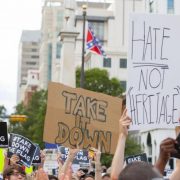Center Talk Editorial: My Flag or Yours?
My Flag or Yours?

By Lisbeth Gant-Britton
July 6, 2015 – Two black women. One flag. Two very different views. The women? Bree Newsome and Karen Cooper. Over what do they differ? The Confederate flag, just as South Carolina legislators prepare on Monday, July 6th to take up the issue once again of when and where the controversial banner may fly.[1] In part, the lawmakers are responding to the tragic shooting of nine people in the Emanuel African Methodist Episcopal Church in Charleston, South Carolina on June 17th. Just the next day, the U.S. Supreme Court ruled that states like Texas could deny citizens the right to put special images like the Confederate flag on their license plates.[2]
In Columbia, South Carolina, on June 27th, Black Lives Matter activist, Brittany “Bree” Newsome scaled the flagpole outside the South Carolina Statehouse and (temporarily) removed the Confederate flag at dawn just before funeral services for members of the church group that had been tragically killed.[3] Declaring that she couldn’t wait any longer for the politicians to decide whether the controversial standard should come down, the daughter of Clarence G. Newsome (former Howard dean and President of the National Underground Railroad Freedom Center) took matters into her own hands.[4] Word of her and her partner’s arrest spread with lightning speed, and within days of being taken away by authorities, an Internet fund had been established for her freedom and analogies were being made to Rosa Parks’ refusal to give up her seat on that Montgomery, Alabama bus.[5]
Actually, the entire Civil Rights Movement has been dubbed “the Second Reconstruction”[6], as twentieth-century activists were forced to organize Part II of that first nineteenth-century Reconstruction effort that ended so disastrously. The 1950s activists hoped to finally overcome the zealous efforts of Confederate flag loving southerners, whom some say are still fighting the Civil War today.[7]
But nowadays, not all of those proudly displaying the Rebel Flag are white. Some African Americans, like Virginia resident, Karen Cooper, a New York transplant who has joined The Tea Party and who considers U.S. laws to be “tyranny,” argues that the southern flag is a “symbol of freedom.”[8] And young University of South Carolina African American male, Byron Thomas contends that no one (not even gunman, Dylann Storm Roof)[9] can make him stop hanging his Confederate flag in his home because, for him, it symbolizes the tremendous efforts made by his ancestor, who was a cook for a South Carolina regiment in the Civil War. He says, “I do not feel offended by the flag.”[10]
Meanwhile in cities like Tucson, Arizona near the Mexican border, it’s not the Rebel Flag which makes many citizens of color uncomfortable, it’s the good ole Red, White and Blue. Tucson has a large Latino/a population but one that is still policed by a significantly white police force,[11] similar to the situation in Ferguson, Missouri. Some Spanish-speaking residents express concern over racial profiling, especially among youth.[12] Arizona is the same state that in 2010, in the name of protecting its citizens, targeted “the Chicano, or Mexican American, studies program in the Tucson school system.”[13] The law bans schools from teaching classes that are “designed for students of a particular ethnic group, promote resentment or advocate ethnic solidarity over treating pupils as individuals.”[14]
So, all told, depending on who you are and where you live, it’s been some Fourth of July. The burgers and hot dogs have been barbequed, the grill washed and bunting put away. But large swathes of the country are still grappling with very different interpretations of “life, liberty and the pursuit of happiness.” What’s your take? Is this the “land of the free and the home of the brave”? Or as Frederick Douglass noted in 1852 when asked “What, to the American slave, is your 4th of July?”–he observed: “Do you mean, citizens, to mock me, by asking me to speak to-day?”[15].

